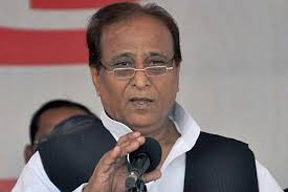 NEW DELHI: The Supreme Court today sought explanation from UP Police on the circumstances leading to the arrest of a boy for allegedly posting on Facebook objectionable comments against senior SP leader Azam Khan.
NEW DELHI: The Supreme Court today sought explanation from UP Police on the circumstances leading to the arrest of a boy for allegedly posting on Facebook objectionable comments against senior SP leader Azam Khan.
A bench comprising justices J Chelameswar and R F Nariman asked the UP police to file response to the petition alleging that the Supreme Court advisory that section 66A of the Information Technology Act would not be invoked without consultation of high ranking police officers like IG or DCP was violated.
“We will examine,” the bench said and posted the matter after four weeks.
Senior advocate Soli Sorabjee, appearing for petitioner in the matter, drew the attention of the bench to the apex court’s May 16, 2013, advisory which made it clear that no case would be lodged under the controversial provision of the law unless and until there is an approval from high ranking officers like IG or DCP.
The counsel appearing for UP government said that nothing has been left in the matter as the boy has been released on bail and there are remedies available to him under the law.
When Sorabjee said that during the hearing of petitions challenging the validity of the section 66A of the IT act he should have pressed for the stay of the operation of the provision, the bench said, “Very often the laws are misused but we can not stay all laws because of being misused.”
The SC had yesterday agreed to hear the plea seeking explanation from the UP Police on the matter in which a Class XII student was arrested for allegedly posting on Facebook ‘objectionable’ comments against the leader.
By the time advocate Manali Singhal made an oral mention of the application, news had reached that the 19-year-old youth was granted bail and would walk out of the jail shortly on completion of formalities.
A local court had on March 18 sent the Bareilly youth to 14 day judicial custody.
The present application questioning his arrest was filed by a Delhi-based girl and law student Shreya Shingal, who was the first person to file a PIL challenging the validity of section 66A of the IT Act.
She has also sought amendment in Section 66A of the Act, after two girls – Shaheen Dhada and Rinu Shrinivasan – were arrested in Palghar in Thane district as one of them posted a comment against the shutdown in Mumbai following Shiv Sena leader Bal Thackeray’s death and the other ‘liked’ it. The apex court had in 2013 said a person, accused of posting objectionable comments on social networking sites, cannot be arrested without police getting permission from senior officers.
The direction had come in the wake of numerous complaints of harassment and arrests, sparking public outrage.
The court had, however, refused to pass an interim order for a blanket ban on the arrest of such persons across the country.
In the present application, Shreya said she came to know through media about the arrest of the boy under section 66A of the Information Technology Act and sections 153A (promoting enmity between different groups on grounds of religion, race, etc), 504 (intentional insult with intent to provoke breach of peace) and 505 (public mischief) of the Indian Penal Code.
She referred to media reports that the boy’s parents have clarified that he had only shared the post and didn’t upload it on the social media platform.
However, Rampur Superintendent of Police Sadhna Goswami had said that the boy had allegedly confessed that he posted the picture which had a statement attributed to Azam Khan, the application said which also referred to reports that the boy also accepted that he didn’t actually understand the meaning of what he was posting.
Rampur district Judicial Magistrate Azad Singh had granted bail to the boy on furnishing two bail bonds worth Rs 20,000 each and asked him to cooperate with police during investigation.
A local court had on March 18 sent the Bareilly youth to 14 day judicial custody.–PTI






